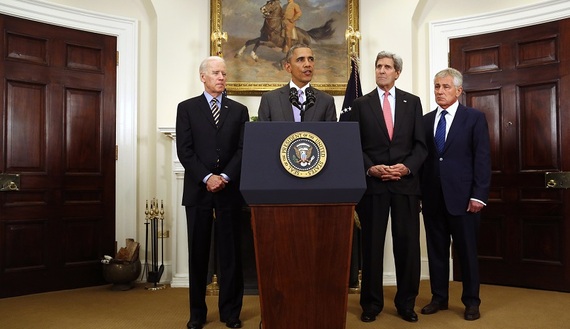 U.S. President Barack Obama is flanked by Vice President Joe Biden (L), Secretary of State John Kerry (2nd R) and Defense Secretary Chuck Hagel (R) as he delivers a statement on legislation sent to Congress to authorize the use of military force against the Islamic State. REUTERS/Jonathan Ernst.[/caption]
U.S. President Barack Obama is flanked by Vice President Joe Biden (L), Secretary of State John Kerry (2nd R) and Defense Secretary Chuck Hagel (R) as he delivers a statement on legislation sent to Congress to authorize the use of military force against the Islamic State. REUTERS/Jonathan Ernst.[/caption]Recent comments by officials suggest shift from Obamaís previous threats.
WASHINGTONóThe†Obama†administration, seeking to strike a nuclear agreement with Tehran by late March, is significantly playing down the utility of using military force to deny Iran an atomic bomb.
Recent comments by senior U.S. officials suggest a shift in emphasis from President Barack Obamaís previous threats to use military force. Officials now are arguing that any military action would only guarantee Iranís Islamist leaders would move to develop nuclear weapons.
ďWith respect to military action, [a] diplomatic resolution is the only verifiable wayĒ to guarantee Iran doesnít get a bomb, said a senior U.S. official at a briefing held Friday to discuss international nuclear talks. ďThe use of military action would likely insure that Iran would break out and acquire nuclear weapons.Ē
The senior administration official said Tehran would likely decide to move its nuclear infrastructure underground after any U.S. or Israeli airstrikes. Iranís leadership then would commit to building a bomb as a deterrent against future attacks, he said.
Other senior officials have made voiced similar views on military force in recent weeks.
Earlier in his presidency, Mr. Obama stressed that neither Iranian nor Israeli leaders should doubt his resolve to use military force. ďI think that the Israeli government recognizes that, as president of the United States, I donít bluff. I also donít, as a matter of sound policy, go around advertising exactly what our intentions are,Ē Mr. Obama had said in a 2012 interview with the Atlantic magazine.
He added: ďBut I think both the Iranian and the Israeli governments recognize that when the United States says it is unacceptable for Iran to have a nuclear weapon, we mean what we say.Ē
Diplomacy aimed at curbing Iranís nuclear program is entering a critical phase in March as Washington and Tehran try to meet an end of March deadline.
Secretary of State†John Kerry†is resuming direct talks this coming week in Switzerland with his Iranian counterpart, Javad Zarif. Israeli Prime Minister Benjamin Netanyahu, meanwhile, is set to speak before both Congress and Washingtonís most powerful pro-Israel lobby, the American Israel Public Affairs Committee.
Israeli officials have said Mr. Netanyahu will speak out against the direction of the Iran talks and call for a complete dismantling of Tehranís nuclear infrastructure. The Israeli leader has regularly argued the credible threat of force is required to win concessions from Tehran.
Senior U.S. officials said chances of an accord by the end of March are about even. But the senior U.S. official also said the negotiations have ďadvanced substantiallyĒ in recent weeks.
Some officials involved in the diplomacy, including the European Unionís foreign-policy chief, Federica Mogherini, have said in recent days that global powers and Tehran were ďgetting closeĒ to an agreement.
Obama administration officials briefed on the negotiations said the major issues that still need to be resolved include the size of Iranís future capacity to produce nuclear fuel, the duration under which its capacity will be constrained, and the pace at which international sanctions against Tehran would be removed.
European and Iranian officials have suggested a final deal could allow Tehran to maintain around 6,500 centrifuge machines, which are used to enrich uranium into nuclear fuel.
U.S. officials wouldnít confirm the number on Friday, but acknowledged Tehran would maintain a capacity. They also said constraints on Iranís nuclear program would last into ďdouble digitsíí of years, which analysts have interpreted to mean as little as a decade.
Mr. Netanyahu and many Arab leaders have argued that such a formula would allow Tehran to maintain a latent nuclear weapons program, with the prospect of Iran being completely unrestrained by 2025.
U.S. officials were clear they would publicly challenge Mr. Netanyahu during his Washington visit. Both National Security Adviser†Susan Rice†and the U.S. ambassador to the United Nations, Samantha Power, are addressing the American Israel committee next week.
ďTo sayÖno domestic enrichment capacity is to have no agreement. We would be setting a threshold thatís unreachable,Ē the senior U.S. official said. ďWe are going to make the caseÖfor our Iran policy.Ē
The official acknowledged significant tensions between the White House and Israelís government. But he blamed Mr. Netanyahu and congressional Republicans for going behind the White Houseís back and setting up the speech before Congress.
ďWe did not seek out this dynamic that currently exists,Ē the official said.
The pace at which sanctions will be removed is shaping up as one of the major issues possibly blocking the deal, said U.S. and European officials.
Iran publicly has been demanding the immediate removal of sanctions as part of an agreement. Obama administration officials said theyíre pursuing a phased lifting of the sanctions and the potential that they could be ďsnapped backĒ if Tehran is found to have violated the agreement.
By The Wall Street Journal










